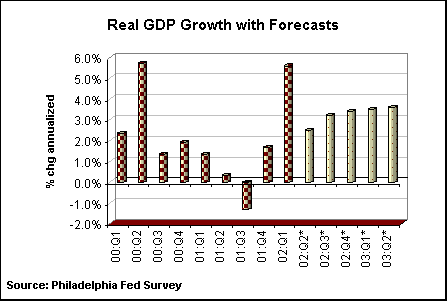| ||||||||||||
|
| ||||||||||||
![[Back To Archive]](../../../images/backtoarchive.gif)
| ||||||||||||
 | |||||||||||||
Look at the market on any given day and you will more likely see more stock indices heading down than up. There is no question that political tensions in the Middle East and between India and Pakistan are hurting investor sentiment. Investors are also embittered by the Enron scandal and its fallout, which has heightened suspicions over companies that serve up dicey financial statements. But the impact of global tensions is usually temporary, and there's nothing new about company scandals. The most important factor behind the stock market is the economy. Granted, market prices may diverge from their fundamental values for a considerable time. Remember the irrational exuberance of the late 1990s. Stock prices surged well beyond fundamental values for more than a few years. But even then, the exuberance wasn’t baseless. Investors believed that the high tech sector would significantly increase productivity, which in turn, would benefit the economy. In fact, productivity gains were relatively modest and the full impact of the benefits of technology has not yet been incorporated into our daily lives. Nevertheless, the bull market in the high tech sector was economically motivated. This brings us to present day. Irrational exuberance has been replaced by irrational depression. It seems that economic data – whether in line with or above economists’ expectations – are just not good enough to sustain a stock market rally. Philadelphia Fed Forecast Survey The Federal Reserve Bank of Philadelphia recently released its quarterly survey of economic forecasts covering 2002 and the first half of 2003. The May survey revealed that forecasters just about doubled their estimates for real GDP growth for 2002 compared with the February survey. Economists are now predicting that real GDP will expand 2.7 percent this year compared with the 1.4 percent estimated about three months ago.  Not surprisingly, the May survey showed upward revisions to several components. Predictions for housing starts and industrial production were boosted. Stronger growth is often associated with a faster inflation rate. In fact, the CPI forecasts were slightly higher in the May survey than the February survey, but inflation remains subdued nevertheless. Stronger growth is also associated with higher interest rates. Though forecasters raised their estimates for the 10-year Treasury note, they lowered estimates for the 3-month bill. Indications from the Federal Reserve that its overnight policy rate will rise slowly are probably depressing short-term rates. But if short-term rates remain too low for too long, then inflationary pressures will emerge. Consequently, long-term rates are rising even though short-term rates are not. A faster rate of economic growth is typically associated with a larger revenue stream and improved corporate profits. In fact, forecasters reduced their estimates for profits in 2002 though they increased their estimates for GDP growth. GDP and national income are two sides of the same coin. Increased GDP growth with a reduction in profit growth implies that the income, which has to go somewhere, would head into workers' pockets. Higher wages would no doubt translate into increased consumer spending. Market interpretation It is possible that even though economists’ expectations have become more optimistic about growth, equity investors are not yet convinced that these forecasts will be realized. Perhaps investors ignored the Philadelphia Fed's report. Even though economic growth forecasts improved, economists did not revise higher their predictions for corporate profit gains in 2002. It is also possible that market players are more worried about political events than they let on. A recent Barron's article noted that many market professionals believe that another terrorist attack on U.S. soil would not only dampen stock prices, but keep them down longer than the initial attacks of September 11. The Bottom Line Today’s market environment is a difficult one in which to make decisions on stock purchases (and sales). It is certainly easier to consider buying equities when you see prices climb day after day. Yet long-term investors are more likely to profit from stock purchases when they “buy low”. In the long run, one has the best opportunity to buy low when the market is in the dumps. Certainly, the economic environment is favorable when economists are revising up, rather than down, their forecasts of economic growth. American investors, however, may be fearful of more than an economic slump. If we are looking only at a slump due to basic economic factors (too much supply that needs time to be absorbed by somewhat slower demand), investors realize that the economy and the market will eventually turnaround. However, if there is an unconscious fear surrounding terrorism in the United States, then stock prices could be depressed for an indefinite period of time. Are economic fundamentals once again being thrown out? | |||||||||||||